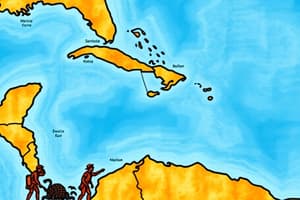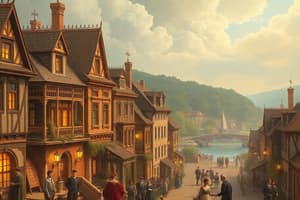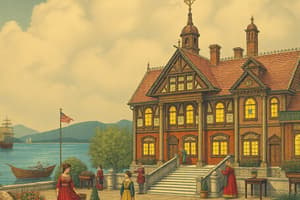Podcast
Questions and Answers
Study Notes
Key Figures and Events of 1700s American History
-
Exploration and Colonization:
- Silk Road: Caravan route connecting China and Europe.
- Land Bridge: Land connection between Asia and North America during the last Ice Age.
- Marco Polo: Italian explorer who traveled to China and brought goods back to Europe.
- Ferdinand and Isabella: Spanish monarchs who unified Spain and funded Columbus's voyages.
- Columbus: Italian explorer who sailed to the Americas seeking a westward route to India.
- Prince Henry: Portuguese prince who started a navigation school.
- Vasco da Gama: Portuguese explorer who sailed around Africa to India.
- Ferdinand Magellan: First to circumnavigate the globe.
- Nunez de Balboa: Spanish explorer who crossed the Isthmus of Panama and saw the Pacific Ocean.
- Aztec Empire: Located in present-day Mexico.
- Tenochtitlan: Capital of the Aztec Empire.
- Francisco Pizarro: Spanish conquistador who conquered the Inca Empire.
- Henry Hudson: Explorer who claimed what is now New York for the Dutch.
- Jaques Cartier: French explorer who sailed up the St. Lawrence River.
- St. Augustine: Oldest fort in the US, built by the Spanish in Florida.
- Treaty of Tordesillas: Treaty settling land disputes between Portugal and Spain.
-
Native American History:
- Corn: Staple food source for Native Americans in Mexico and South America.
- Norsemen: Blonde-bearded explorers who established a settlement in Newfoundland.
- Metacomet (King Philip): Native American leader who started a war in 1675-76.
- Squanto: Native American who aided the Separatists settlers.
-
European Power Struggles:
- Spanish Armada: Naval fleet defeated by England in 1588.
- Roanoke Colony: English colony that disappeared.
- King James I: King of England in 1603.
- Jamestown settlement (1607): First permanent English settlement in North America (Virginia).
- House of Burgesses (1619): First representative assembly in the colonies.
- Divine Right of Kings: Belief that kings were chosen by God and above the law.
-
Development and Conflict:
- English Civil War (1641-1652): Conflict between Cavaliers and Roundheads in England.
- King James II: Catholic King of England (1685-1688).
- Glorious Revolution (1688): Bloodless overthrow of King James II.
- William III and Mary of Orange: Crowned King and Queen of England.
- English Bill of Rights (1689): Enshrined rights for English citizens.
- Dominion of New England: British attempt to control colonial governments.
- Sir Edmund Andros: British governor of the Dominion of New England.
- The Dutch West India Company: Powerful Dutch trading company.
- William Penn: Given land grant to establish "Penn's Woods" (Pennsylvania).
- New Amsterdam: Original name for New York City under Dutch control.
- The Quakers: Religious society of friends.
- Roger Williams: Colonist banned from the Massachusetts Bay Colony.
- Thomas Hooker: Colonist banned from the Massachusetts Bay Colony who established Connecticut.
- Anne Hutchinson: Colonist banned from the Massachusetts Bay Colony for questioning Puritan authority.
-
Colonial Society and Economy:
- Indentured Servitude: System where people worked for a set time in exchange for passage to the Americas.
- Triangular Slave Trade: Trade system linking Africa, the Caribbean, and the Americas.
- Southern Society Hierarchy: Plantation owners, subsistence farmers, and slaves.
- Albany Plan of Union (1754): Plan for colonial defense proposed by Benjamin Franklin.
- George Washington: Led British troops against the French in the early years of the French and Indian War.
- French and Indian War (Seven Years' War, 1756-1763): Conflict between England and France for control of North America.
- Treaty of Paris (1763): Ended the French and Indian War, giving England control of much of North America.
- American Revolution: War for independence from British rule.
- Declaration of Independence: Document declaring the American colonies' independence from Britain.
- Thomas Jefferson: Main author of the Declaration of Independence.
- Thomas Paine: Author of "Common Sense," a pamphlet advocating for American independence.
- George Rogers Clark: American general who fought in the West.
- John Paul Jones: Naval hero of the American Revolution.
- Valley Forge: Winter encampment during the American Revolution.
- Saratoga (1777): Turning point of the Revolution, leading to French alliance.
- Yorktown (1781): British surrender, effectively ending the revolution.
- Treaty of Paris (1783): Treaty that ended the American Revolution. -Boston Massacre (1770): Event where British troops fired on colonists, killing five.
- Boston Tea Party (1773): Protest against British taxation.
-
Colonial Issues:
- The Coercive/Intolerable Acts: British laws passed to punish Boston after the Boston Tea Party.
- Sons of Liberty: Organization of colonists who opposed British tax policies.
- John Peter Zenger: Colonist who was tried for libel, paving the way for freedom of the press.
- Patrick Henry: Colonist who spoke out against British policies.
- Nathan Hale: American soldier who was executed as a spy.
Summary of Key Events 1770s
- 1770s: Boston Massacre -> Intolerable Acts -> First Continental Congress.
Studying That Suits You
Use AI to generate personalized quizzes and flashcards to suit your learning preferences.
Description
This quiz covers significant explorers and events from the 1700s that shaped American history. Explore the journeys of figures like Columbus and Magellan, and understand the impact of events like colonization. Test your knowledge on how these historic moments influenced the development of the Americas.




